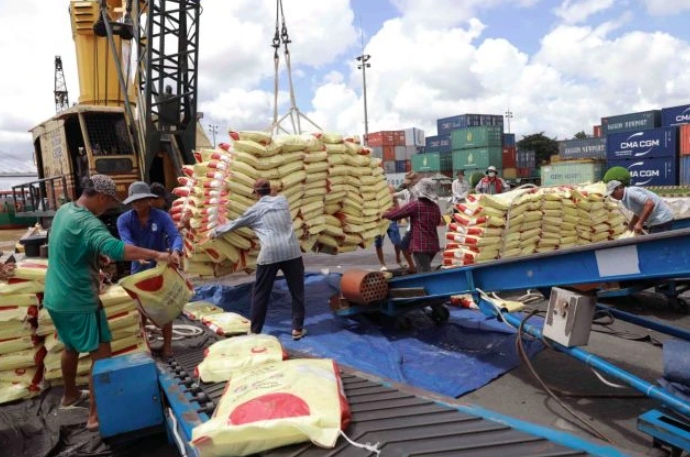Philippine tax cut opens up new opportunities for Vietnamese rice exports
The reduction of the rice import tax by the Philippines will create more advantages and increase opportunities for Vietnamese rice to enter the market later this year, insiders said.
The Philippines, one of the world's largest rice buyers and biggest importers of the Vietnamese grain, has officially announced a reduction in rice import taxes from 35% to 15%, effective from early August this year and lasting until 2028.
This can be seen as the latest action by the Philippine government to tackle inflation, especially the increase in rice prices in the market so far this year.
In the first quarter of 2024, the Philippines’ economy was relatively stable, except for the price increase of some essential consumer goods, particularly rice, which saw an increase of about 24.4%. The rice prices account for approximately 9% of the Consumer Price Index (CPI) of the Southeast Asian country.
According to the Vietnam Trade Office in the Philippines, the country is Việt Nam’s largest buyer to date, accounting for over 80% of the total rice imported into the Philippine market.
Vietnam exported 1.44 million tonnes of rice to the Philippines as of May 23, accounting for 72.9% of the total import of the grain of the country.
Nguyen Van Don, Director of the Viet Hung Co. in the southern Tien Giang province, said that the Philippine market is currently fond of several Vietnamese rice varieties such as DT8 and 5451.
The popularity of Vietnamese rice in the country's Metro Manila area and southern provinces is thanks to its delicious taste and reasonable price, meeting the needs of local consumers, especially the middle and low-income population, Dong told tienphong.vn.
He said that in the past two years, Philippine traders have often ordered Vietnamese rice during the main harvest season with abundant supply, so that in turn they can be able to buy rice at lower prices.
According to Dong, both Vietnamese businesses and partners and rice buyers in the Philippines will benefit from the Philippine rice import tax reduction.
Philippine customers can buy rice at a cheaper price, thereby encouraging this country's businesses to foster their rice imports. At the same time, Vietnamese firms can improve profit margins, increase selling prices and speed up their rice shipments to this market without having to compete with domestically produced rice, he spoke to the online newspaper.
Meanwhile, Nguyen Van Thanh, Director of the Vinh Long province-based Phuoc Thanh IV Production-Trading Company, said that the tax cut will help the Philippine rice market become more vibrant in the final months of the year.
Recently, both sellers and buyers have stood back from the market and waited for the Philippine new tax policy.
So now sales negotiations can resume which will help Vietnamese rice benefit the most when it has the advantage of fresh products, low costs, and fast delivery, Thanh told tienphong.vn.
However, not only Vietnamese businesses but also Thai businesses can enjoy these opportunities from the tax reduction, Thanh said, adding that Thai companies are trying to increase rice production and expand their exports to the Philippines, resulting in fierce competition for Vietnamese rice.
According to the latest data from the Department of Agriculture’s Bureau of Plant Industry, the Philippines' total rice imports rose by 20.3% to 1.97 million tonnes in the reviewed period. The country’s total rice imports are estimated to reach about four million tonnes in 2024.
The rice trade between Vietnam and the Philippines is forecast to remain steady shortly, according to the Vietnam Trade Office in the Philippines.
Vietnamese rice caters to Philippine preferences with its quality, variety, and competitive prices, Trade Counsellor Phung Van Thanh said.
The consistent supply, both in volume and price, aligns perfectly with the Philippines' annual import needs and geographical proximity also translates to cost-effective transportation, he said.
Beyond these factors, Vietnamese rice enjoys a trade advantage through bilateral and multilateral agreements like the ASEAN Trade in Goods Agreement (ATIGA) and the Regional Comprehensive Economic Partnership (RCEP), which offer benefits not available to non-ASEAN rice exporters like India and Pakistan.
Looking ahead, Thanh advised Vietnamese rice exporters to focus on maintaining their top position in the Philippines. This can be achieved through continued collaboration with the Ministry of Industry and Trade and Vietnamese authorities in the Philippines, such as the Vietnamese Embassy and Trade Office, to organise promotion events.
He also suggested exploring the potential of medium and lower quality rice to cater to a broader range of Filipino consumers.



